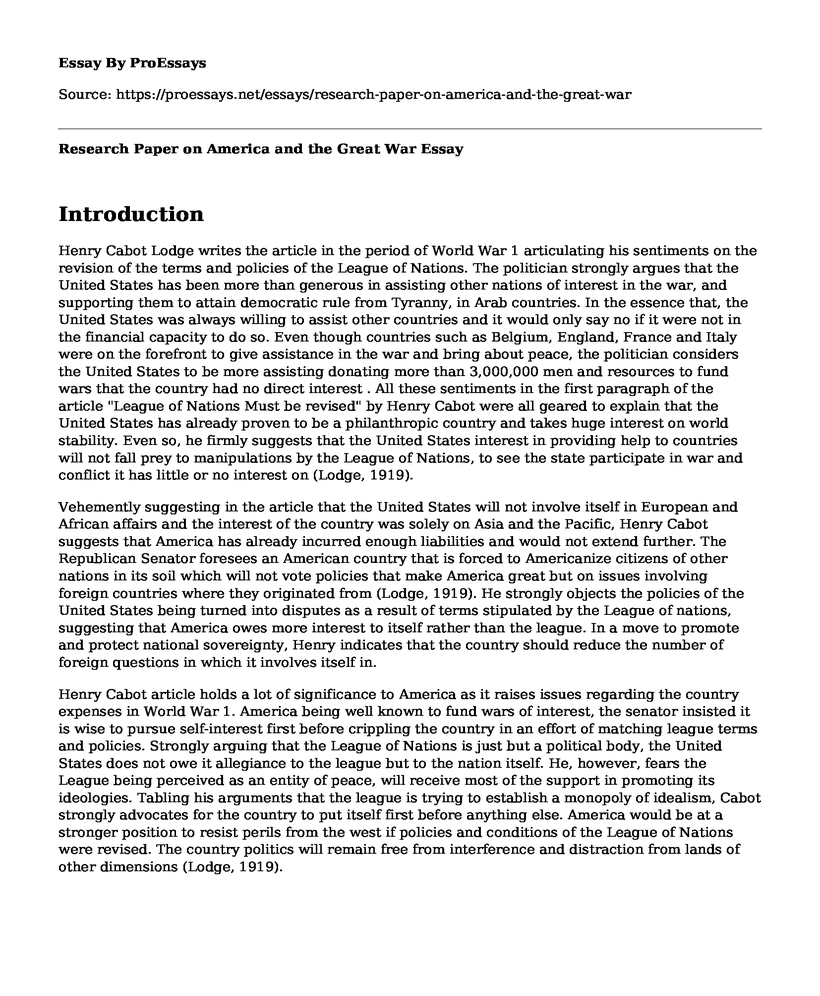Introduction
Henry Cabot Lodge writes the article in the period of World War 1 articulating his sentiments on the revision of the terms and policies of the League of Nations. The politician strongly argues that the United States has been more than generous in assisting other nations of interest in the war, and supporting them to attain democratic rule from Tyranny, in Arab countries. In the essence that, the United States was always willing to assist other countries and it would only say no if it were not in the financial capacity to do so. Even though countries such as Belgium, England, France and Italy were on the forefront to give assistance in the war and bring about peace, the politician considers the United States to be more assisting donating more than 3,000,000 men and resources to fund wars that the country had no direct interest . All these sentiments in the first paragraph of the article "League of Nations Must be revised" by Henry Cabot were all geared to explain that the United States has already proven to be a philanthropic country and takes huge interest on world stability. Even so, he firmly suggests that the United States interest in providing help to countries will not fall prey to manipulations by the League of Nations, to see the state participate in war and conflict it has little or no interest on (Lodge, 1919).
Vehemently suggesting in the article that the United States will not involve itself in European and African affairs and the interest of the country was solely on Asia and the Pacific, Henry Cabot suggests that America has already incurred enough liabilities and would not extend further. The Republican Senator foresees an American country that is forced to Americanize citizens of other nations in its soil which will not vote policies that make America great but on issues involving foreign countries where they originated from (Lodge, 1919). He strongly objects the policies of the United States being turned into disputes as a result of terms stipulated by the League of nations, suggesting that America owes more interest to itself rather than the league. In a move to promote and protect national sovereignty, Henry indicates that the country should reduce the number of foreign questions in which it involves itself in.
Henry Cabot article holds a lot of significance to America as it raises issues regarding the country expenses in World War 1. America being well known to fund wars of interest, the senator insisted it is wise to pursue self-interest first before crippling the country in an effort of matching league terms and policies. Strongly arguing that the League of Nations is just but a political body, the United States does not owe it allegiance to the league but to the nation itself. He, however, fears the League being perceived as an entity of peace, will receive most of the support in promoting its ideologies. Tabling his arguments that the league is trying to establish a monopoly of idealism, Cabot strongly advocates for the country to put itself first before anything else. America would be at a stronger position to resist perils from the west if policies and conditions of the League of Nations were revised. The country politics will remain free from interference and distraction from lands of other dimensions (Lodge, 1919).
References
Lodge, H. C. (1919). The League of Nations Must be Revised. Congressional Record.
Cite this page
Research Paper on America and the Great War. (2022, Dec 05). Retrieved from https://proessays.net/essays/research-paper-on-america-and-the-great-war
If you are the original author of this essay and no longer wish to have it published on the ProEssays website, please click below to request its removal:
- Expansion Beginning 1500 of Asian Empires
- Race During the Industrial Revolution Essay
- Analysis of China, Taiwan, and the United States Paper Example
- Essay Sample on Slavery in America: The Removal of 6-7 Million Slaves
- Article Analysis Essay on Slavery and Abolition in the 20th Century
- Essay Example on Evolution of Artwork: Ancient Egyptian Art, The Woman from Willendorf
- Free Essay on 100 Years Since Women Gained Right to Vote: Imagining a World Without It







